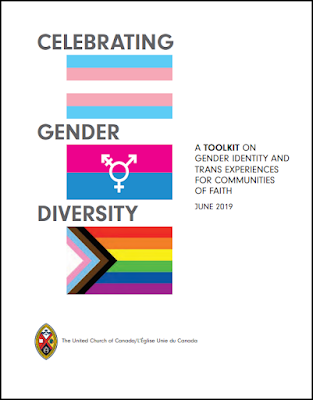Beyond Church Walls
In 2019, The United Church of Canada produced "Celebrating Gender Diversity: A Toolkit on Gender Identity and Trans Experiences for Communities of Faith."
I was invited to contribute because of the qualitative and quantitative study I did as part of my MA in 2015 titled "Transgender Spirituality Pulse Survey."
This is what I wrote:
Beyond Church Walls
When I speak with ministers and church people who ask me how they can become affirming and welcoming of trans and non-binary persons, a question is often raised. “Why bother going through all the work of becoming an affirming congregation if, after all the hard work, not many trans persons are going to join my church community?”Because being affirming and welcoming is not fully measured just by how you treat people who enter the four walls of your church or sanctuary. What matters is how the members of your congregation treat trans people out in the world.
Consider the following questions—these are just a few. How you answer these types of questions will bear witness to how inclusive and accepting of trans and non-binary persons you really are.
- If your 10-year-old child has a trans classmate, will that trans child be invited to play with your child? Or will you allow your child to go to the trans child’s home to play?
- Will you allow your son or daughter to date a trans person?
- Will you reach out to the trans relative or neighbour who has been shunned by others?
- If you own or manage a business, will you hire a trans person?
- If you own a rental property or want a housemate to share the rent, will you welcome a trans person?
- If you are having a neighbourhood event, will you include the family with a trans person?
- If you patronize a business—such as a coffee bar or restaurant—that employs trans persons, will you support it and recommend it to your friends?
- Will you not only show solidarity at events such as a Transgender Day of Remembrance but also attend, for example, school board, city council, or parks board meetings when trans inclusion is on the agenda?
- Will you write to your elected officials in support of trans-inclusive policies?
- Will you try to befriend and include a fellow worker or employee who is trans?
- Will you step into a conversation to offer informed commentary when others mock or say pejorative things about trans persons? In other words, will you challenge transphobic remarks?
- Will you make it a practice to show respect to a trans person by using their chosen name and pronouns?
- The fear of constant judgment and scrutiny
- Concern over being belittled and/or not accepted
- Being anxious about false assumptions and attitudes
- Being misnamed, misgendered (wrong pronouns), and/or being outed
- Make friendly eye contact
- Don’t use a dismissive tone or language
- Don’t assume sexual orientation
- Signal warmth and openness
- Don’t ask unnecessary questions (for example, have you had surgery?)
Conclusion:
Being considerate and respectful, regardless of a person’s gender identity or gender expression, does not require special skills. Rather, display basic human respect.Download the Toolkit PDF:
https://united-church.ca/.../def.../files/trans-kit_2019.pdf
https://united-church.ca/.../def.../files/trans-kit_2019.pdf



Comments
Post a Comment
I welcome your comments, and to maintain a friendly platform, please avoid demeaning or pejorative rants, but of course, that doesn't apply to you. Right?